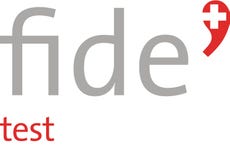The fide exams - Français, Italiano, Deutsch in Switzerland
Originally developed by the Institute of Multilingualism in Freiburg, on behalf of the Confederation - the fide exam was developed in order to promote linguistic integration in Switzerland.
The end goal of the fide test is to provide people who speak other languages and have immigrated to Switzerland with an opportunity to develop and provide proof of their competency in their new language. The
The fide exam is therefore often used for migrant applications to prove language proficiency. Since January 2019, most non-Swiss nationals must prove proficiency in the language spoken in the desired place of residence when applying for a residence or settlement permit.

The benefits of preparing for and undertaking the fide exam
- Broadly recognized certification which can be used for all migrant applications in Switzerland including: Resident permits, settlement permits, early settlement permits as well as naturalization
- We offer highly effective individual preparation with suitable learning media and materials
- High scheduling flexibility
- Actual testing available onsite at our Berlitz language center in Lausanne

Elementary use of language A1
- Can make him- or herself understood in the personal living context, e.g. at work or in (the children’s) school in a simple way, if the person they are talking to speaks slowly and clearly and is prepared to help where necessary.
- Can introduce him- or herself and others with simple words.
- Can give short, simple answers to questions about his/her person, e.g. where they live, work, children.
- Can put forth his/her own concerns, e.g. in the living environment or when shopping, in prepared and practiced sentences.

Elementary use of language A2
- Can understand simple questions and messages associated with important areas of life, e.g. questions and information on school, education, work, health or living situation.
- Can express him- or herself in simple, routine situations in a government office or other public institution requiring a direct exchange of information on familiar things.
- Can describe his/her own origins, education and work experience in simple words and report on personal experiences

Independent use of language B1
- Can understand important information from a school, employer, landlord or public authority if a clear standard language is used and familiar topics are being discussed.
- Can cope with the majority of situations in everyday live, at work or in public spaces.
- Can express him- or herself simply and coherently about familiar topics, personal interests and experiences.
- Can describe his/her own opinions, goals, hopes or wishes and substantiate or explain these briefly.
Take the fide test at your Berlitz center!
Everything you need to know to take the fide test.
- Entire test: CHF 250.-
- Oral part only: CHF 170.-
- Written part only: CHF 120.-
- Oral part: 40 minutes
- Written part: the introduction takes around 15 minutes, the test takes 60 minutes
You can access the schedule here.
At your Berlitz language center in Lausanne:
Rue de la Louve 1,
1003 Lausanne
You can access the mock exam here.
Find the rules for taking the fide test here.
Please fill out this registration form to take the fide exam with Berlitz Lausanne.
The exam can be canceled or rescheduled upon presentation of a medical certificate no later than 48 hours before the exam. You will not be refunded if you do not show up for the exam.
Find out more
Fill in the form below and we’ll contact you to discuss your learning options and answer any questions you may have.

